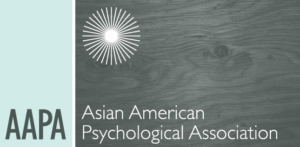(NEW THIS YEAR: The 2018 AAPA Convention has its own website! Please see details below for link and proposal submission instructions.)
ASIAN AMERICAN PSYCHOLOGICAL ASSOCIATION
2018 ANNUAL CONVENTION
August 8, 2018
San Francisco, California
CALL FOR PROPOSALS
INTERACTIVE SESSIONS * DIFFICULT DIALOGUES * SYMPOSIA * POSTERS
Submission Deadline: April 15th, 2018 at 11:59 p.m. PST
IMPORTANT – READ:
**Proposals that address the convention theme will be prioritized**
**Given our tight timeline, we are NOT able to extend the submission deadline this year**
ABSTRACT SUBMISSION INSTRUCTIONS:
- To submit an abstract, you must first create an account by registering on this page: (https://aapa2018.dryfta.com/en/attendees-authors-registration)
- After registering, Dryfta (portal company) will email you a temporary password, which you will use to sign in to the system for the first time. You will be prompted to change your password.
- After you are logged in, click on “Abstract Submissions” at the top of the page and follow the template to complete and submit your abstract proposal.
2018 AAPA CONVENTION WEBSITE:
https://aapa2018.dryfta.com/en/
THEME:
THROWING ROCKS, BUILDING BRIDGES:
Centering and Uplifting our Intersecting Voices
This year’s theme continues to build on previous convention themes with the goal of encouraging necessary and difficult conversations that can strengthen research, practice, and advocacy efforts in Asian American mental health. Our theme for this year focuses on individual and community empowerment that centers around (re)claiming space, uplifting our voices, and acknowledging all the intersecting identities that make us unique. Intersectionality is defined by Kimberlé Williams Crenshaw as “how overlapping or intersecting social identities, particularly minority identities, relate to systems and structures of oppression, domination, or discrimination.” Our hope is that this theme will be a call to action to honor those that inspire us to keep fighting for our values and beliefs while acknowledging the efforts of AAPA’s current and past members.
“Throwing rocks, building bridges” is a tribute to the past, present, and future of AAPA. We stand upon the shoulders of our elders – the ones who have provided the rocks necessary for the current generation to throw. As rock throwers and agitators, the current generation pushes the boundaries necessary to successfully propel AAPA into the future, with the recognition that we are in the same fight. Our elders laid the foundation from where we build the bridges to our common goals. By encouraging members to acknowledge our past and present, we aim to move towards breaking down walls and building bridges between AAPI and other groups, our multiple identities, and subgroups within AAPA in celebration for the future of our organization.
We are seeking proposals that draw attention to the experiences of those with multiple intersecting identities, underrepresented Asian American groups (e.g., South Asians, Southeast Asians, Filipinos, religious minorities, LGBTQIA+, international folks), as well as those that bridge past AAPI research or clinical applications with present or future directions. In addition, we are interested in submissions that focus on collaborative projects (both nationally and internationally), interdisciplinary scholarship, multicultural perspective, cross-cultural psychology, and other works that further social justice movements. We encourage submissions from researchers, community leaders and activists, mental health providers, and educators who work with underrepresented communities. Moreover, we welcome submissions from professionals and scholars in allied fields (e.g., Anthropology, Asian American Studies, Communication, Education, History, Law, Nursing, Political Science, Public Health, Psychiatry, Social Work, and Sociology) with whom we collaborate and whose work informs Asian American mental health.
Proposals may address, but are not limited to, the following topics within AAPI mental health:
- Intersections of social identities such as race, gender, and sexual orientation (examining complexities of our different identities, focus on the different experiences)
- Research/outreach with underrepresented AAPI groups (Southeast Asian, Pacific Islanders, LGBTQ, etc.)
- Collaborative and interdisciplinary work examining the diversity of the AAPI community
- Exploration and examination of existing research, conceptual, and/or therapeutic models with AAPI groups and adaptations/supplements to such models (e.g., cultural adaptations to cognitive behavioral therapy models, using both minority stress and intersectionality frameworks in research and/or clinical work)
- Research, outreach and other topics involving the LGBTQIA+ communities
- Social reform, public policy, and political action (involvement of AAPIs in current national and international political movements)
- Social justice and equity
- Immigration, immigration reform, needs and challenges of immigrant communities (examination of different adaptation experiences, process of acculturation, code switching, etc.)
- Identity development across different racial/ethnic minority groups (while incorporating intersectionality such as racial and ethnic identity development at different ages/across the lifespan, intersections of race/ethnicity and gender identity development, etc.)
- Experiences of intersectional microaggression and other forms discrimination (e.g., gendered racism, sexualized racism, generational differences across experiences of discrimination, international perspectives on discrimination and microaggressions)
- Inter/within group conflicts; intergroup coalitions
- Mental health and health disparities (research, outreach, programs that focus on access to care)
- Increasing visibility in the education system and clinical and counseling settings
- Multicultural, and polycultural perspectives
- Increasing visibility of AAPIs with multiple heritages
Who May Submit
Individuals (AAPA members and non-members) at all levels of training (professional, graduate level, and undergraduate level), including non-psychologists interested in mental health issues affecting AAPIs are encouraged to submit proposals. We particularly encourage submissions from those interested in AAPI mental health who have not previously participated in AAPA conventions. Because strengthening the diversity of our colleagues in other organizations is of particular importance for psychologists of color, we strongly encourage submissions from members of other organizations, including but not limited to, the Association of Black Psychologists, Society of Indian Psychologists, and the National Latina/o Psychological Association.
While there is no limit to the total number of submitted proposals per person, individuals can only be the first author of one proposal submission. In the event that multiple first author submissions are received from an individual, the committee will review only the first proposal received. Exempted from this rule are presenters who are invited speakers.
- Deadline for all submissions is April 15th, 2018 at 11:59 p.m. PST
- All presenters are required to officially register for the convention
Types of Submissions
- Interactive Sessions: In a typical 90-minute session, a facilitator introduces the topic and sets up a context
for subsequent discussions and interactions among participants. For questions about submitting an
interactive session proposal, please contact Sessions Co-Chair Yun Garrison at aapasessionscommittee@
- Difficult Dialogues: In this 90-minute session, a facilitator engages participants in a meaningful
dialogue about issues that are difficult to discuss in everyday conversations. Proposal submissions must delineate how facilitators will establish and manage a safe space that promotes respectful expression of opposing views, and provides an environment in which differing perspectives are defended, heard, and considered by participants who hold conflicting cultural values and ideas. For questions about submitting a difficult dialogue session proposal, please contact Sessions Co-Chair Yun Garrison at aapasessionscommittee@
- Symposia: In a typical 90-minute symposium, three or four presentations are given around a common
theme. An expert discussant may provide feedback. The symposium proposal submission must include
one program summary that integrates the multiple presentations within the session. It must also
clearly indicate the titles and contents of each presentation within the symposium. A chair for the
symposium must be named on the application portal. No individual paper proposals for symposium
presentations are accepted. For questions, please contact Yun Garrison at aapasessionscommittee@
- Posters: Posters are displayed to disseminate information on various conceptual and/or empirical reports.
During the designated 90-minute poster session, participants are invited to interact with poster presenters. Single research papers should be submitted as posters. For questions, please contact Poster Session Co-Chairs are Iris Miao at irismiao831@gmail.com and Dieu Truong at dmtruong@central.uh.edu.
Guidelines for Proposals
- All online proposals will need to include:
- Contact information for each presenter
- Abstract (500 to 700 words) with no author names
- Program Summary (50 to 100 words) with no author names
- 3-4 Learning Objectives (not required for poster submissions)
- Proposals will be sent for anonymous reviews. As such, the Abstract and Program Summary should not include identifying information of the author(s) and/or presenter(s).
- Submitters will be notified by email upon receipt of their proposal.
- For submissions that may be eligible to award Continuing Education units (CEs), individual authors will be contacted to provide additional information.
- Submission outcomes will be sent via email by May 5th, 2018.
Proposal Rating Criteria
Proposals will be rated based on the following criteria:
- Relationship to convention theme
- Relevance/timeliness of topic
- Membership appeal
- Innovation and creativity
- Scientific/empirical soundness (for research symposia and posters)
- Adequacy of strategy for involving audience (for interactive sessions and difficult dialogues)
- Contribution to the field
Additional Information
Presenters should bring their own laptops (those with Mac laptops should bring the appropriate adaptor to connect to the LCD projector). LCD projectors for PowerPoint presentations will be provided. Requests for additional AV equipment will be addressed after the final selection of presenters has been decided.
Visit the 2018 AAPA Convention website at https://aapa2018.dryfta.com/en/ for more information.. For all other questions regarding the 2018 AAPA Convention, please email one of this year’s co-chairs, Nic Rider at nicole.rider@gmail.com or Justine Fan at justine.angela17@gmail.com.




